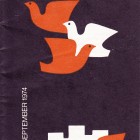Vision of Thérèse 1974Royal Opera, Stockholm
Read more about the opera Vision of Thérèse
Fifteen years after the Royal Opera from Stockholm had made a first Edinburgh Festival appearance, they returned with a memorable pair of early 20th century masterpieces. Of the four operas brought to Edinburgh by the Swedes in 1974, Jenůfa and Elektra were performed in a conventional, but thrilling, way. The recent work, The Vision of Thérèse, of 1964, was performed in the round at STV's Gateway studios. A little-known Handel pastorale, Il pastor fido, completed their offering.
Scottish Opera ventured into the supposedly rarified world of Gluck for the first time, with an under-rated staging of Alceste. The Festival's own production of Don Giovanni was revived from the previous year. There were also rare performances of two Schoenberg pieces, Pierrot Lunaire with Cleo Laine and Erwartung featuring Anja Silja. They fitted a Schoenberg theme that also included Catherine Gayer in some of his cabaret songs and Heather Harper in the Second Quartet.
What more could one ask for? - How about a return visit by Carlo Maria Giulini to conduct the Verdi Requiem?
The opera schedule was as follows:
First week, commencing 19 Aug: Mon Alceste; Tue -; Wed Don Giovanni; Thu Alceste; Fri Don Giovanni; Sat Alceste.
Second week, commencing 26 Aug: Mon Don Giovanni; Tue Alceste; Wed -; Thu Elektra; Fri -; Sat Jenůfa.
Third week, commencing Sun 1 Sep: Sun Elektra; Mon Vision of Thérèse; Tue Il pastor fido & Vision of Thérèse; Wed Jenůfa; Thu Il pastor fido; Fri Elektra; Sat Jenůfa.
This turned out to be a successful and highly absorbing opera in a technically challenging form. Two conductors were required, and some of the amplified sound-effects appeared to be coming from under the stage. Mounting it in the Gateway posed a technical challenge which the Swedes overcame triumphantly. For non-Swedish speakers there were inevitable problems with following every detail of the plot. Could a successful production be achieved with surtitles?
Performance Cast
- Thérèse an aristocratic lady
- Françoise Thérèse's maid
- Street-sweeper
- Stranger
- Julien a post-office clerk
- Blind Violin Player
- Colombel Thérèse's fosterbrother
- First Factory Girl
- Second Factory Girl
- First Officer
- Second Officer
- Third Officer
